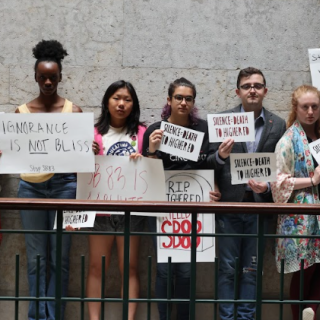Advertisement
A year ago this month, Ohio finally did the right thing and passed a medical marijuana law. It was a caring and honorable move, especially when you consider there are hundreds if not thousands of children and adults in the state suffering from epilepsy.
Research has proven time and time again that cannabidiols or CBDs with extremely low levels of THC, such as Charlotte’s Web or Epidiolex, are miracle medicines for epilepsy. Unlike what Big Pharma has to offer, CBDs work and don’t have potential side-effects like vomiting and liver damage. These researchers say many of their patients report nearly half as many seizures when using a CBD. What’s more, their patients are also more cognizant, happier and, no surprise, a little more hungry.
That being said, a father from Ohio with a 9-year-old epileptic daughter told the Free Press he’s still unable to legally acquire a CBD because the Ohio Medical Marijuana Control Program is going through growing pains as it crawls toward full functionality.
According to the state, the program won’t be 100 percent operational until the fall of 2018, and Ohio physicians, for the time being, are unable to give prescriptions for Charlotte’s Web or Epidiolex. There are no medical marijuana dispensaries in Ohio licensed to fill them and are not expected to open until next year. You could order CBDs or other cannabis products from Colorado but you risk federal drug charges. You could grow your own but that is illegal under the Ohio program.
In place of a prescription then, Ohio physicians are allowed to give recommendations to their patients to use CBD or THC if they can find a way to acquire it, no questions asked, this according to Tessie Pollock, spokesperson for the State Medical Board of Ohio. The recommendation gives the patient an affirmative defense if ever arrested for possession.
“Ohio physicians are not prohibited from giving a recommendation but this has nothing to do with the state of Ohio program because that part of the program has not been set up yet,” says Pollock. “What we are saying is, ‘Okay Ohio physicians, if you are wishing to recommend before the program is established, then we encourage you to contact your private attorney and get advice on what you should do.’”
The father of the epileptic daughter, however, says even if Ohio physicians are not prohibited from doing so, no doctor will give him a recommendation for a child because they told him the law has too much gray area and too much unfinished business regarding legalities. The father is an advocate for families with epileptic children, who he says can’t get a recommendation either.
“Technically, you can legally possess it if you had the doctor’s recommendation, which I can’t get,” says the father who would not offer his name for publication. “But If I could (get a doctor's recommendation for medical marijuana), you still can’t grow it, you can’t buy it, you can’t sell it, you can’t give it away. So technically a leprechaun would have to come to your house and deposit it. It’s so absurd it’s kind of funny.”
Equally absurd is how the law will only allow Ohio’s major universities to test the state’s medical marijuana in their labs during the first year when the program is fully operational. The state wants universities, such as Ohio State, to test and measure the medicine’s level of THC, for example.
The problem is, says Rob Ryan, executive director of the Ohio Patient Network, is that Ohio State, University of Cincinnati and others, recently told the Cincinnati Enquirer they have no plans, so far, to oblige the state’s request to test the medicine.
“That’s the ten dollar question I have put forward for three months,” says Ryan. “No testing means no commercial sales. I have been trying to raise awareness and alarm bells.”
Ryan says this could further delay the program, potentially for another year. Mind-boggling is how some of these universities are currently researching CBDs or marijuana for epilepsy or other neurological disorders. Ohio State, for example, has conducted research on how marijuana can be good for the aging brain by reducing inflammation and the formation of new brain cells, and may even help prevent or delay the onset of Alzheimer’s.
Ryan says the usual suspects – lawyers and federalies – are influencing and telling these universities to forgo the testing that could help an estimated 200,000 to 300,000 Ohioans.
“Because their lawyers are like, ‘We may lose our federal contracts.’” he says.
Indeed, Ohio’s Medical Marijuana Control Program is revolutionary for a state many medical marijuana proponents believed would be one of the last to pass such legislation. Governor John Kasich and the Ohio General Assembly should be commended.
But, as one nationally recognized marijuana activist sees it, Ohio’s law is too much about making money first and helping children with epilepsy second. Russ Belville of the popular 420Radio says if the state were truly utopian and existed to serve the people, Ohio parents of epileptic children, on the day the law was passed, could grow it themselves and make their own CBDs.
“The miracle of medical marijuana is that you can grow your own healing medicine for cheap,” he says. “No smoking and no home grow just makes cannabis like any other Big Pharma drug. You have to buy it from The Man.”



